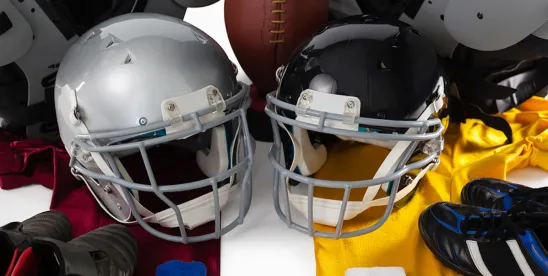The recent ANA Advertising Law 1-Day Conference, hosted in Katten’s New York office, included a panel about current legal trends in sports marketing featuring Sports and Sports Facilities Partner Daniel Render and Executive Vice President, Business Affairs, and Chief Legal Officer of BSE Global Jeff Gewirtz. BSE Global owns the Brooklyn Nets, the New York Liberty and Barclays Center.
Throughout the discussion, Daniel and Jeff examined how sponsorships of and partnerships with sports leagues, teams and events continue to evolve, as well as the key legal issues that should be considered by brands investing in sports, on the one hand, and leagues, teams and venues, on the other hand. Daniel and Jeff noted the following key considerations in particular:
Understanding Different Perspectives: To ensure that all parties' needs and expectations are met and that a deal is finalized in an efficient manner, it’s crucial to understand both the brand and league/team/venue perspectives when negotiating sports marketing deals.
Business-Back Opportunities: "Business-back opportunities" are a significant motivator for brands to associate with sports venues. These opportunities may include, for example, the opportunity to serve a brand’s beverages, have its IT systems used or have its credit cards be marketed as the preferred mode of transaction for a league/team or at a venue.
Community Engagement: Sports sponsorship is not just about advertising — it's also about fostering local community ties and support. A brand’s chief marketing officer may encounter challenges when relying solely on marketing campaigns generated by ad agencies to organically create the goodwill associated with the sponsorship of a professional sports team that has a prolific track record and has fostered a lot of local pride. For example, if a regional bank wants to highlight community ties, having connections with a local team can be an excellent way to organically highlight its standing in the local community. In bigger markets, associating with one of the marquee teams or venues can also show the prestige of a brand.
Complexity of Sponsorship Alliances: Brands should understand the unique legal issues associated with different types of sponsorship alliances, which can range from global (such as the Olympic Games) to local/regional (local professional sports teams). For venues, naming rights sponsors are typically the most important source of sponsorship revenue – when a venue is being built and developed, the naming rights sponsor is usually the first sponsor in the door. For naming rights sponsors, category exclusivity is paramount, including protecting against “ambush marketing” and other forms of exclusivity infringement. Meanwhile, teams/venues seek to preserve flexibility to splice and dice categories and sponsorship inventory among as many sponsors as possible to increase revenue opportunities. The complexity of these considerations is intensified when the ownership and control of a venue differs from the owner of the team(s) playing in that venue, since those owners then have diverging sets of sponsors and economic incentives.
Note that there is an important distinction between sponsorship alliances and direct athlete endorsement alliances. Despite their affiliations with leagues, athletes typically have autonomy in terms of deals with brands related to, for example, patches, manufacturers’ logos and footwear, as well as profit from those associations.
Clear Agreements: For sports leagues/teams/venues, clear drafting of the exclusivity provisions and related exceptions is needed to avoid unintentionally inhibiting future revenue generation opportunities. The level of specificity in sponsorship agreements has increased significantly over the past five to 10 years as leagues/teams/venues have become hyper-focused on revenue maximization opportunities, especially for complex categories such as water, alcoholic beverages and credit cards that can be, and often are, subdivided and negotiated.
In addition to the importance of the agreement’s language itself, an agreement helps set the parties’ expectations for relationships that are often set up to last a long time over different management regimes. If a league/team/venue sells a category to one sponsor and is not careful with the legal language in the agreement, even if on lucrative terms, it could unduly inhibit their ability to generate revenue in the future.
Category Exclusivity and Exclusivity Exceptions: Agreements not only need to clarify what’s included in a particular category, but they should also specify what does not fall within that category. It can be helpful to also include examples of third parties that inhabit those exceptions. Clear drafting gives the team/venue the ability to continue to sell sponsorships to other sponsors with a clear understanding of the rules of the road.
As an example: if a sponsor receives the right to be a venue’s exclusive credit card provider, does this include debit cards, and how does this relate to a venue’s ability to accept different forms of payment within the venue? Teams/venues need to retain the ability to explain to fans, in a factual manner, that other forms of payment are accepted without that being confused as an attempt to undercut the official credit card sponsor’s exclusivity protections. In scenarios where a new sponsor's category might overlap with a preexisting sponsor's category, the new sponsor would typically be informed about this overlap. Then, the existing sponsorship agreement would be carved out as a permitted exception to exclusivity granted to the new sponsor.
Brand Perception: When negotiating category exclusivity, it’s important to also consider brand perception and how the public understands the brand’s meaning. In many instances, it’s important to appreciate how the brand presents itself and how it’s understood, particularly when it comes to exclusivity restrictions. For legal practitioners, understanding the business of the brand and that of the league/team/venue is paramount.
Changes in League Rules: All sponsorships of professional sports teams are subject to compliance with the applicable league’s rules. Agreements should address how unanticipated changes in league rules that affect the sponsorship will be handled. This typically involves the team agreeing to provide equivalent replacement benefits, refunds or even termination rights if those changes result in limitations on the sponsor’s ability to receive full anticipated value for its sponsorship fees. In instances where originally contemplated benefits cannot be provided, teams/vendors prefer to offer replacement benefits as the remedy as much as possible. However, brands may consider seeking termination rights in instances where the sponsor is not able to receive the fundamental sponsorship benefits it bargained for, such as when a key aspect of its sponsorship category becomes prohibited.
Morals Clauses: Sponsors typically seek to include morals clauses to protect the sponsor’s reputation. Leagues/teams/venues usually resist providing these provisions or at least seek to limit their potential impact, given the high-profile nature of teams and their players.
Force Majeure and "Most Favored Nation" Clauses: These clauses have gained importance in the wake of COVID-19. Force majeure clauses dictate the parties’ respective rights if circumstances outside of their control result in sponsorship benefits not being provided to the sponsor, which occurs most commonly if games are lost or played without fans due to natural disasters, epidemics or labor stoppages. Similar to changes in league rules, remedies typically involve the team/arena agreeing to provide equivalent replacement benefits, refunds or even termination rights if a force majeure event limits the sponsor’s ability to receive full anticipated value for its sponsorship fees. Again, in instances where originally contemplated benefits cannot be provided, teams/vendors prefer to provide replacement benefits as the remedy as much as possible. Brands often attempt to stop paying sponsorship fees during force majeure events, while teams/venues seek to receive continued payments and will then “true up” as needed after the force majeure event ceases.




 />i
/>i
